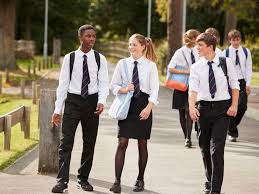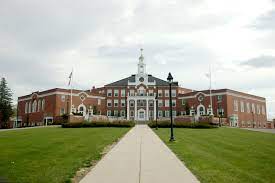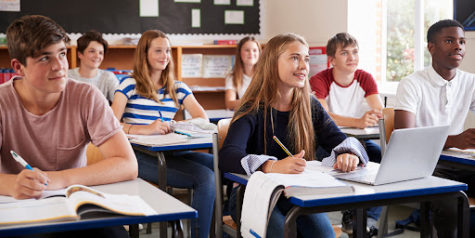Public v.s. Private Schools: It’s More Than Just a Financial Decision

(Photo Source: usatoday.com)
November 7, 2022
The decision between private or public schools has always been complicated for students and families. On the surface, private schools are seen to only attract those that are wealthy or smart. This stereotype is often believed by the majority of students and families that do not undergo this change. In contrast to private schools, public schools are seen for those that cannot afford these idealistic standards, leaving a diverse amount of kids to roam the hallways of public school grounds.
Stereotypes
Have you ever asked someone, “Hey, what school do you go to?”, and they respond with a private school, like Pingree or Governors? Oftentimes, our reaction to this causes us to concentrate on one single aspect: money.
Those that are fortunate enough to go to a private school are frequently viewed to be wealthy and, evidently, are the only reason they got in. Required to wear a sharp blazer, logo-stained tie, and, to pull it off, a white button-down T-shirt, private school kids, on the surface, are thought to be the perfect student. I mean, I cannot blame them; I even believe it myself.
Yes, financial status is a huge factor when juxtaposing the two.
Compared to when students say they go to a public school, like Newburyport or Triton, there really is no negative nor positive towards students’ responses. Public schools are just there for the kids in between, with a wide variety of students ranging from straight-As smart to D-plus dumb. Private schools, in difference, contain the same student throughout their campus: Smart, organized, respectful – any good quality that applies to a well-rounded student. In appearance, private schools are seen to have no negatives when it comes to their students, nor is the system seen to be substandard.
Kate Conover, a sophomore at Pentucket, was quick to state her opinion about the stereotypes related to private schools. “I think it is mostly based on education. Like if you’re super smart, you’ll probably go to a private school since private schools can give out scholarships to kids that aren’t as wealthy. But then again, there are those families that just want their kid to get a better education, and so, they’re willing to pay for that.”

Although money is a major factor, individuals may overlook the reality that some kids may go just because they are smart. It takes a lot, considering how many apply, to get into a prestigious school like Brooks, Pingree, or Exeter Academy. And, although many have the money to buy their way into their dorms, education can and always will play a role.
From the perspective of an actual private school student, Ethan Ferrant, a Junior at Governors, also states his reasoning for these stereotypes.
“I’m sure everyone has come across these stereotypes but there are some pretty basic ones like private school kids are just a bunch of spoiled brats running around with daddy’s money,” Ethan Ferrant explains.
Ferrant also brings up the other stereotype that “…public kids aren’t as smart and they’re ‘lesser’ than the private school kids”.
Ethan Ferrant does a great job illustrating both sides of the stereotype, and, quite frankly, isn’t wrong. Many students and families believe that these stereotypes are a reality, which can contribute to either a negative or positive viewpoint towards both schooling types.
However, there is more to both private and public schooling than the stereotypes society fabricates. Private or public schools will always differ from each other depending on the environment, area, and community, not just the opinions people create in their heads.
Education
We’ve considered the stereotypes for both public and private schools, but what about the actual aspect of learning? Private schools have always been expected to provide larger workloads than the homework public schools offer. However, although it is implied that the workloads differ, do they truly make a difference in how the student learns?
Ethan Ferrant answered this question easily. “I think one thing private schools tend to do really well is provide the student with easy and accessible tools they need to succeed,” Ethan Ferrant says as he describes his experience at the Academy.

Ferrant describes the opportunities available at his private school, “There is a really extensive tutoring program, numerous breaks throughout your schedule to give you time to manage work and meet with your teachers . . . and much more.”
Based on Ferrant’s personal experience, we can conclude that private schools, although the workload is heavy, supply
their students with reasonable time and breaks to get the work done. And, based on Governors and the help they provide, make sure their students obtain the information rather than just studying and forgetting, as most students do. This is a crucial element to consider, assuming that most students at public schools are not given this many breaks in a singular day nor are most teachers considerate of the amount of time it takes to complete an assignment with both sports and other classes to do.
Of course, this all comes down to the school, but for private schools, it is easy to say their students get enough time to finish their work and learn it thoroughly based on the breaks and tutoring sessions they provide.
As for learning at a public school, this teaching environment differs…a lot.
“I think it can be hard, especially as an athlete, to manage homework, sports, and having 6-7 classes a day. It makes it difficult with no breaks to get everything done with good quality,” Kate Conover claims.
Kate Conover makes a valid point about the learning circumstances in public schools. It can be difficult to balance 6-7 classes a day without any breaks, except if you have a study hall, which, in most cases, is not usually assigned to everyone. And, on top of that, balancing sports and 1-2 hours of homework per night does not seem realistic for teenagers and what they need.
Whether it is the stereotypes, environments, or the workloads public and private schools provide, it can be difficult to pick between the two when given the choice. There are many positive and negative aspects that come with the experience, and learning how to move around those obstacles can be overwhelming for many.
Depending on the school and the individual themself, a private or public school may be the right, or wrong, choice. It is pretty clear that this choice is more than just a financial decision, and more for the kid and where they feel most comfortable.

Alison Hood • Nov 21, 2022 at 11:44 am
I found this article very interesting, and I like how someone who attends private school was able to describe their experience. I never knew that private schools provide students with lots of resources to help them succeed. Overall it seems that there are many positives and negatives to attending a private school.
Kate Conover • Nov 9, 2022 at 11:20 am
This article was very well written. I think this covered almost all the differences between public and private schools. This was very interesting and helpful to those who are thinking about switching to public or private schools.